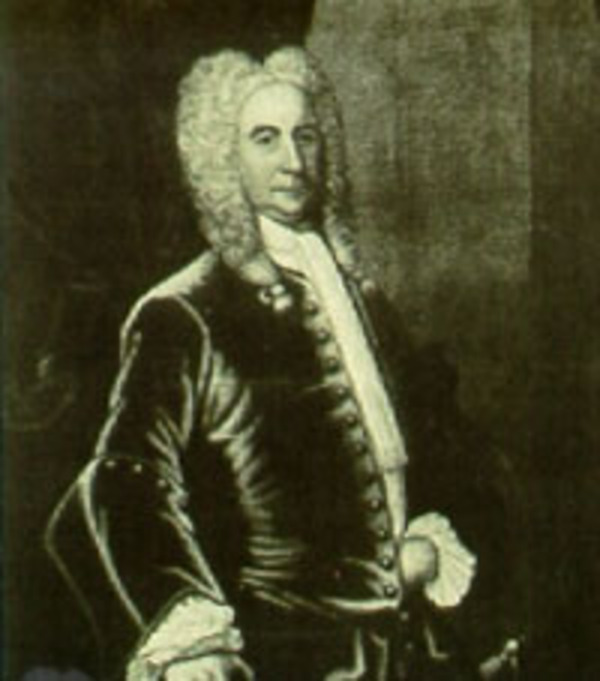
Source: Link
SCHUYLER, JOHANNES (John), military officer, envoy to the Iroquois; b. 5 April 1668 (o.s.) at Albany, New York, the sixth and youngest son of Philip Pieterse Schuyler and Margarita Van Slichtenhorst; d. February 1747 at Albany.
Growing up in Albany, the centre of the fur trade in New York province, John Schuyler became familiar with wilderness living and had frequent contact with the neighbouring Iroquois. War broke out between France and England in 1689, and in February of the following year a French force under Jacques Le Moyne* de Sainte-Hélène attacked Schenectady. That summer Schuyler volunteered to join a colonial expedition against Canada. Troops under the command of Major-General Fitz-John Winthrop were to proceed against Montreal via Lake Champlain, while Sir William Phips* sailed up the St Lawrence to Quebec. John and his brother Peter* served with the land forces.
Winthrop led his army to Wood Creek (Rivière du Chicot) at the headwaters of Lake Champlain but, impeded by a shortage of canoes to transport his troops and of provisions to feed them, he made no further progress. John Schuyler volunteered to lead a company into enemy territory, so Winthrop commissioned him captain, supplied him with canoes, arms, and supplies, and sent him off with 29 white and 120 Indian volunteers. He left camp on 13 Aug. 1690 and on his way down Wood Creek met Captain John Sanders Glen, who joined the expedition with 13 white men and five Indians. They paddled northward down Lake Champlain and the Richelieu River, to the vicinity of Fort Chambly. Leaving their canoes, they turned westward and came to Prairie-de-la-Madeleine (Laprairie) on the south bank of the St Lawrence, opposite Montreal. Shortly before their arrival, Governor Frontenac [Buade*] had returned to Montreal with about 1,200 troops he had brought to Prairie-de-la-Madeleine to counter Winthrop’s forces. On 23 August Schuyler’s men attacked. Although they did not capture the well-defended fort at Prairie-de-la-Madeleine, they took some prisoners and destroyed dwellings, barns, cattle, grain, and hay. They returned to Albany on 30 August, having saved the first colonial expedition against Canada from utter contempt.
Schuyler obtained land at Saratoga (Schuylerville, N.Y.), 20 miles north of Albany, where he built mills and a small fort and accumulated considerable property. Through his friendship with the Iroquois he was able to obtain information on raids planned by the Indians and warn the neighbouring settlers. In 1695 he had married Elizabeth Staats in Albany. Their grandson, Philip John, became one of George Washington’s generals.
Between 1703 and 1706 John Schuyler was mayor of Albany, and was later a member of the provincial assembly. He also served in Albany as a justice of the peace, an alderman, a lieutenant of a cavalry company, and, beginning in 1711, a commissioner of Indian affairs. Several English governors used him as a courier to the Iroquois because he was liked and trusted by them. In 1724 Lieutenant Governor William Dummer of Massachusetts appointed him a commissioner to negotiate with the Iroquois. He visited Canada in 1713 and again in 1725 (with William Dudley and others) seeking the return of prisoners.
The “Journal of Captain John Schuyler [1690]” is printed in Documentary history of New-York (O’Callaghan), II, 160–62. For other primary materials on Schuyler, see: Calendar of council minutes, 1668–1783 (N.Y. State Lib. Bull., LVIII, Hist., VI, Albany, 1902). Charlevoix, History (Shea). “Correspondance échangée entre la cour de France et le gouverneur de Frontenac, pendant sa seconde administration (1689–1699),” APQ Rapport, 1927–28, 38–39. NYCD (O’Callaghan and Fernow). Coleman, New England captives. W. J. Eccles, Frontenac: the courtier governor (Toronto, 1959). G. W. Schuyler, Colonial New York; Philip Schuyler and his family (2v., New York, 1885).
Cite This Article
John H. G. Pell, “SCHUYLER, JOHANNES (John),” in Dictionary of Canadian Biography, vol. 3, University of Toronto/Université Laval, 2003–, accessed December 31, 2025, https://www.biographi.ca/en/bio/schuyler_johannes_3E.html.
The citation above shows the format for footnotes and endnotes according to the Chicago manual of style (16th edition). Information to be used in other citation formats:
| Permalink: | https://www.biographi.ca/en/bio/schuyler_johannes_3E.html |
| Author of Article: | John H. G. Pell |
| Title of Article: | SCHUYLER, JOHANNES (John) |
| Publication Name: | Dictionary of Canadian Biography, vol. 3 |
| Publisher: | University of Toronto/Université Laval |
| Year of publication: | 1974 |
| Year of revision: | 1974 |
| Access Date: | December 31, 2025 |



